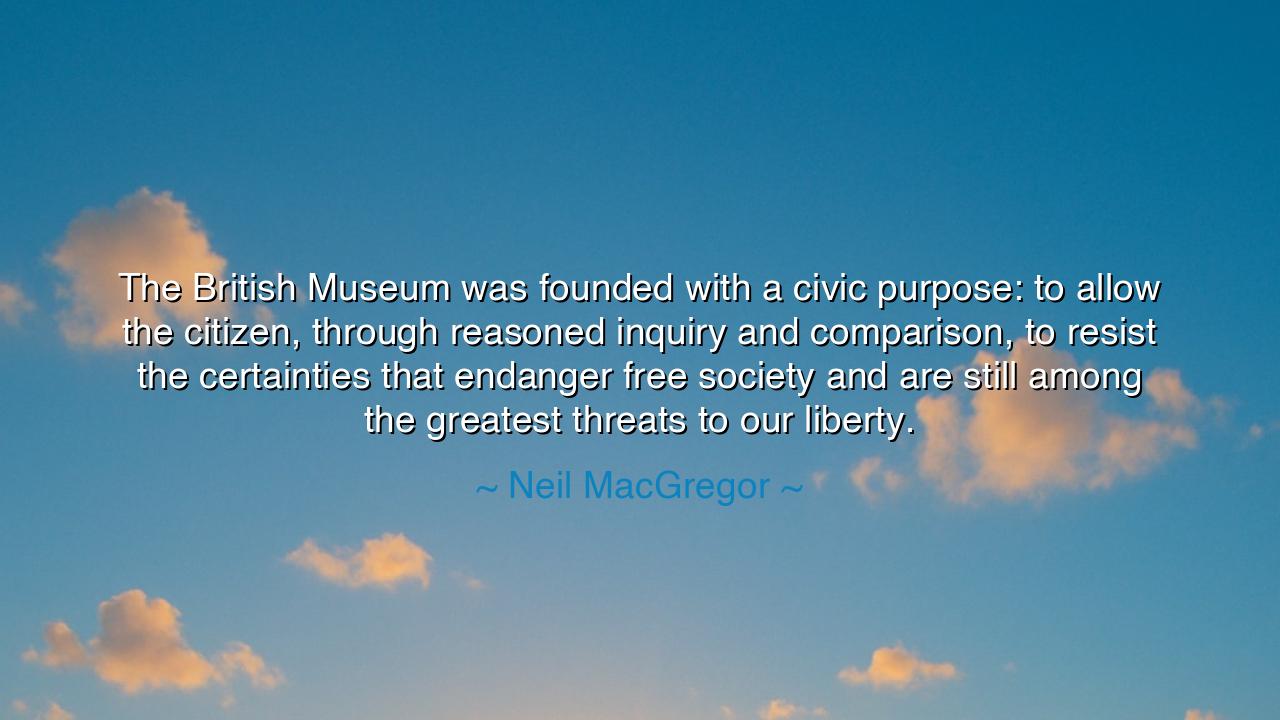
The British Museum was founded with a civic purpose: to allow the
The British Museum was founded with a civic purpose: to allow the citizen, through reasoned inquiry and comparison, to resist the certainties that endanger free society and are still among the greatest threats to our liberty.






Hear the words of Neil MacGregor, the guardian of history and interpreter of civilizations, who declared: “The British Museum was founded with a civic purpose: to allow the citizen, through reasoned inquiry and comparison, to resist the certainties that endanger free society and are still among the greatest threats to our liberty.” These words are not merely about stone walls or ancient relics. They are a summons to remember that knowledge is the shield of the people, and inquiry the weapon of freedom.
The British Museum, born in the age of Enlightenment, was not meant as a palace for kings, but as a treasury for all. Within its halls, the citizen could walk among the wisdom of Egypt, the artistry of Greece, the tablets of Mesopotamia, the relics of empires long perished. By comparing the customs, laws, and beliefs of many peoples, men and women were called to humility: to see that no civilization holds a monopoly on truth, and that the arrogance of certainty leads only to tyranny.
This principle—of reasoned inquiry against blind certainty—was the very spirit of the Enlightenment. In that age, when dogma sought to bind men’s minds, philosophers rose and said: “Let us question, let us compare, let us reason.” And so libraries, salons, and museums became the arenas where thought could breathe free. The British Museum became not a vault, but a battlefield against ignorance, where the weapon was curiosity and the victory was liberty.
History itself bears witness to the danger of certainties unchallenged. Recall the long shadow of the Inquisition, when certainty of belief burned books and silenced voices. Recall the terrors of fascism, when certainty in race and power crushed nations. Recall the gulags of communism, where certainty in ideology erased the dignity of millions. Each time, a people abandoned inquiry, and in its place enthroned certainty. Each time, liberty perished. Thus, MacGregor reminds us: the true enemy of a free society is not chaos, but certainty untested by reason.
Consider the story of Athens. In the marketplace, Socrates asked his questions, tearing down the false certainties of politicians and sophists. His inquiry angered the city, and for it, he drank the hemlock. Yet his death gave birth to philosophy, and through Plato and Aristotle, his spirit still questions us. The museum, like the agora, is a place where citizens meet the many voices of history, and are reminded that truth is not fixed in stone, but discovered in dialogue.
The teaching here is profound: liberty survives not in silence, nor in obedience, but in questioning. A museum is not only a keeper of the past—it is a defender of the future. It shows us that humanity has tried many paths, believed many truths, and that wisdom comes not from worshiping one, but from comparing all. In its galleries, one learns humility: to see that what we hold as certain may be seen by another age as folly. This humility is the soul of freedom.
Therefore, let us draw the lesson: be citizens of inquiry. Do not cling to certainties as if they were chains of safety. Walk into libraries, museums, and halls of learning. Read the voices of the past, compare them, wrestle with them. And in daily life, question what society praises, what leaders declare, what crowds believe. In this questioning lies your liberty, and in silence lies your servitude.
And so, remember the civic purpose spoken of by MacGregor: the British Museum, and all repositories of knowledge, exist not as monuments of pride but as guardians of freedom. They remind us that a free society is not defended by armies alone, but by citizens who, through reasoned inquiry and comparison, resist the dangerous seductions of certainty. To walk among the relics of the past is to learn the wisdom that keeps liberty alive.






AAdministratorAdministrator
Welcome, honored guests. Please leave a comment, we will respond soon